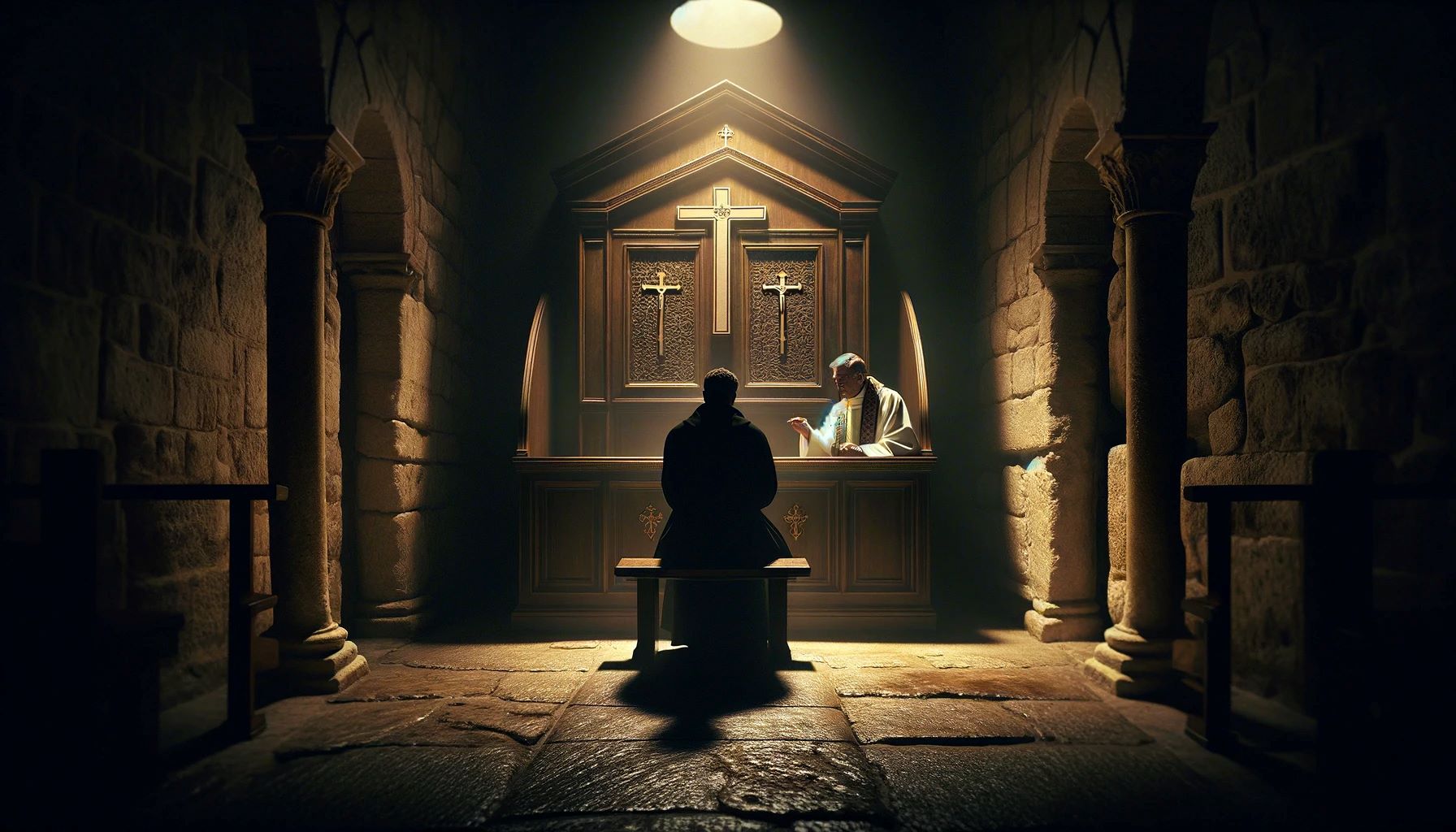Home>Christian Life>What Is The Seal Of Confession?


Christian Life
What Is The Seal Of Confession?
Published: March 5, 2024
Jason DeRose, Managing Editor at Christian.net, uses his expertise in religion and journalism to deepen understanding of faith's societal impacts. His editorial leadership, coupled with a strong academic background, enriches the platform’s diverse content, earning him recognition in both journalism and religious circles.
Discover the significance and sanctity of the Seal of Confession in Christian life, and its role in the sacrament of reconciliation. Understand its importance and implications.
(Many of the links in this article redirect to a specific reviewed product. Your purchase of these products through affiliate links helps to generate commission for Christian.net, at no extra cost. Learn more)
Table of Contents
The Importance of Confidentiality in the Catholic Church
Confidentiality in the Catholic Church is of utmost importance, especially when it comes to the Seal of Confession. This sacred practice ensures that individuals can confess their sins to a priest without fear of their confessions being disclosed to anyone else. The confidentiality of the confessional is a fundamental aspect of the Catholic faith, and it serves several crucial purposes.
-
Spiritual Trust: The Seal of Confession fosters a deep sense of trust between the penitent and the priest. Knowing that their confessions are kept strictly confidential allows individuals to be completely open and honest about their sins, enabling them to seek genuine repentance and spiritual healing.
-
Encourages Confession: The assurance of confidentiality encourages individuals to confess their sins without reservation. It provides a safe space for them to unburden themselves and seek guidance without the fear of judgment or repercussions.
-
Preservation of Privacy: The Seal of Confession upholds the privacy of individuals seeking spiritual counsel. It ensures that their personal struggles and moral dilemmas remain protected within the sacred confines of the confessional.
-
Maintains the Integrity of the Sacrament: By upholding the confidentiality of confessions, the Catholic Church maintains the integrity of the sacrament of reconciliation. This allows for the free and sincere participation of the faithful in this essential aspect of their spiritual journey.
-
Respect for Individual Conscience: The confidentiality of the confessional demonstrates the Church's respect for the individual conscience and the sacred nature of the penitent's relationship with God. It underscores the belief that every person has the right to seek forgiveness and spiritual guidance without fear of exposure.
The Seal of Confession is not only a foundational aspect of the Catholic Church's sacramental practice but also a testament to the Church's commitment to upholding the dignity and spiritual well-being of its members.
Read more: What Is The Sacrament Of Confession
The History and Origins of the Seal of Confession
The practice of confession has been integral to the Christian faith since its early beginnings. In the early centuries of Christianity, public confession of sins was the norm, with penitents openly declaring their transgressions before the entire congregation. However, as the Church evolved, the concept of private confession to a priest emerged. The origins of the Seal of Confession can be traced back to the 4th century, when the Church Fathers began to emphasize the confidentiality of the sacrament of reconciliation. The Council of Nicaea in 325 AD played a significant role in formalizing the practice of private confession, laying the groundwork for the development of the Seal of Confession.
The concept of the Seal of Confession as an inviolable duty of priests to maintain absolute confidentiality of the sins confessed to them took shape over the centuries. The Fourth Lateran Council in 1215 AD, under Pope Innocent III, formally established the obligation of secrecy for priests regarding the sins disclosed in the confessional. This decree solidified the understanding that the seal was not only a matter of practice but also a divine mandate, binding priests to absolute secrecy under penalty of excommunication.
Throughout history, the Seal of Confession has endured as an essential aspect of the sacrament of reconciliation, remaining unchanged in its fundamental principle of absolute confidentiality. The significance of the seal was reaffirmed by the Council of Trent in the 16th century, which emphasized the sacred duty of priests to maintain the confidentiality of confessions, even under the threat of death.
The historical evolution of the Seal of Confession underscores its deep roots in the traditions of the Catholic Church. It reflects the Church's unwavering commitment to providing a safe and sacred space for individuals to seek forgiveness and spiritual healing without the fear of their confessions being revealed. The historical journey of the Seal of Confession serves as a testament to the enduring importance of confidentiality in the sacramental life of the Church.
The Role of the Priest in Maintaining the Seal of Confession
The priest plays a pivotal role in upholding the Seal of Confession, serving as a guardian of the sacred trust bestowed upon them by the penitent and the Church. This role encompasses several key responsibilities that are integral to preserving the confidentiality of the confessional:
-
Guardian of Confidentiality: The priest is entrusted with the solemn duty of maintaining absolute confidentiality regarding the sins confessed to them. They are bound by the Seal of Confession, which prohibits them from disclosing, directly or indirectly, any information shared during the sacrament of reconciliation.
-
Spiritual Counselor: In addition to preserving confidentiality, the priest serves as a spiritual guide and counselor to the penitent. They offer compassionate support, guidance, and absolution, fostering an environment of trust and understanding within the confessional.
-
Absolute Secrecy: The priest is obligated to maintain absolute secrecy even in the face of external pressures or legal mandates. This unwavering commitment to confidentiality is rooted in the priest's sacred duty to honor the sanctity of the confessional and respect the penitent's right to privacy.
-
Sacramental Integrity: As a minister of the sacrament of reconciliation, the priest ensures the integrity of the confessional by upholding the Seal of Confession. This involves a deep reverence for the sacred nature of the sacrament and a steadfast commitment to preserving the sanctity of the penitent's confessions.
-
Penitent's Advocate: The priest acts as an advocate for the penitent, offering them a non-judgmental space to seek forgiveness and spiritual healing. By maintaining the confidentiality of confessions, the priest creates a safe and supportive environment for individuals to confront their sins and pursue reconciliation with God.
-
Divine Mandate: The priest's role in maintaining the Seal of Confession is not merely a matter of practice but a divine mandate. It is a sacred obligation that reflects the priest's commitment to upholding the teachings and traditions of the Catholic Church, ensuring that the sacrament of reconciliation remains a source of grace and mercy for the faithful.
The priest's role in maintaining the Seal of Confession is characterized by a profound sense of reverence, compassion, and unwavering dedication to preserving the sanctity of the confessional. It is a responsibility that underscores the priest's commitment to serving as a conduit for God's forgiveness and a guardian of the penitent's spiritual well-being.
Legal and Ethical Considerations Surrounding the Seal of Confession
The Seal of Confession raises complex legal and ethical considerations that intersect with the fundamental principles of religious freedom, confidentiality, and the administration of justice. While the Catholic Church upholds the inviolability of the confessional seal as a sacred duty, there have been instances where legal and ethical dilemmas have emerged, prompting debates and discussions on the boundaries of confidentiality in the context of the Seal of Confession.
Legal Implications
From a legal standpoint, the Seal of Confession has been the subject of scrutiny in various jurisdictions, particularly in cases where the confidentiality of the confessional clashes with legal obligations to report certain crimes. In some jurisdictions, there are legal mandates requiring individuals, including clergy, to report instances of child abuse or other serious crimes, even if the information is obtained through confidential channels such as the confessional. This presents a legal conundrum, as it challenges the autonomy of religious institutions and their practices in the context of mandatory reporting laws.
The tension between the legal requirements of reporting crimes and the confidentiality of the confessional has led to legal debates and court cases, with some jurisdictions carving out exemptions for the Seal of Confession based on religious freedom protections. These legal considerations underscore the intricate balance between respecting religious rights and ensuring the safety and well-being of individuals, especially in cases involving serious criminal offenses.
Read more: What Are The 5 Steps Of Confession
Ethical Dimensions
Ethically, the Seal of Confession raises profound questions about the boundaries of confidentiality, moral responsibility, and the greater good. While the Church upholds the sanctity of the confessional seal as a sacred trust, ethical considerations come into play when the information disclosed in confession pertains to potential harm or danger to others. This ethical dilemma poses a critical question: How does one reconcile the duty to maintain confidentiality with the moral imperative to prevent harm?
The ethical dimensions of the Seal of Confession have sparked ethical discourse within and outside religious circles, prompting discussions on the ethical responsibilities of clergy, the rights of penitents, and the broader implications for societal well-being. These discussions delve into the complexities of moral decision-making, the preservation of trust within the confessional, and the ethical obligations of individuals who may become aware of potentially harmful information disclosed in confidence.
Balancing Religious Freedom and Public Interest
The intersection of legal and ethical considerations surrounding the Seal of Confession underscores the delicate balance between religious freedom and the public interest. It requires a nuanced approach that respects the autonomy of religious practices while also addressing the legitimate concerns for the safety and welfare of individuals. This balance necessitates thoughtful deliberation, legal clarity, and ethical discernment to navigate the complexities inherent in upholding the sanctity of the confessional seal while safeguarding the well-being of society.
In navigating the legal and ethical considerations surrounding the Seal of Confession, it is essential to engage in constructive dialogue that respects the principles of religious freedom, ethical responsibility, and the pursuit of justice. This dialogue seeks to foster a deeper understanding of the complexities involved and to explore avenues for upholding both the integrity of religious practices and the welfare of individuals and communities.
Controversies and Challenges Related to the Seal of Confession
The Seal of Confession has been the subject of controversies and challenges that have sparked intense debates within and outside the Catholic Church. These controversies stem from the intersection of religious practices with legal, ethical, and societal considerations, giving rise to complex challenges that test the boundaries of confidentiality and moral responsibility.
Legal Challenges
One of the primary controversies surrounding the Seal of Confession revolves around legal challenges that arise when the confidentiality of the confessional clashes with mandatory reporting laws for certain crimes. In jurisdictions where mandatory reporting of crimes, particularly cases of child abuse, is required by law, the Seal of Confession presents a legal conundrum. The tension between the legal obligation to report crimes and the sacred duty to maintain confidentiality has led to legal battles and contentious debates, raising fundamental questions about the autonomy of religious institutions and the limits of legal intervention in religious practices.
Read more: What To Say At Catholic Confession
Ethical Dilemmas
Ethical dilemmas related to the Seal of Confession have been a source of profound controversy and introspection within the Church and broader society. The ethical dimensions of the seal intersect with questions of moral responsibility, the greater good, and the preservation of trust within the confessional. The dilemma of balancing the duty to maintain confidentiality with the moral imperative to prevent harm has prompted deep ethical introspection and ethical discourse, challenging individuals to grapple with the complexities of moral decision-making and the implications for societal well-being.
Public Scrutiny and Perception
The Seal of Confession has also faced scrutiny and criticism in the public sphere, with some questioning the perceived secrecy and lack of transparency surrounding the practice. This public scrutiny has contributed to a broader debate about the role of religious institutions in addressing issues such as abuse, exploitation, and other societal concerns. The perception of the seal as a barrier to accountability and transparency has fueled public discourse, leading to calls for greater transparency while respecting the sanctity of the confessional.
Safeguarding the Integrity of the Sacrament
Amidst the controversies and challenges, the Catholic Church has been tasked with safeguarding the integrity of the sacrament of reconciliation while addressing the legitimate concerns for the safety and well-being of individuals. This dual responsibility requires a delicate balance that upholds the sanctity of the confessional while ensuring that the Church's practices align with the principles of justice, compassion, and accountability.
Navigating the Path Forward
The controversies and challenges related to the Seal of Confession necessitate a thoughtful and discerning approach to navigate the path forward. This involves engaging in constructive dialogue, legal clarity, and ethical discernment to address the complexities inherent in upholding the sanctity of the confessional seal while safeguarding the well-being of individuals and communities. It requires a commitment to upholding the principles of religious freedom, ethical responsibility, and the pursuit of justice, while seeking to foster understanding and address the legitimate concerns that have emerged in the discourse surrounding the Seal of Confession.













